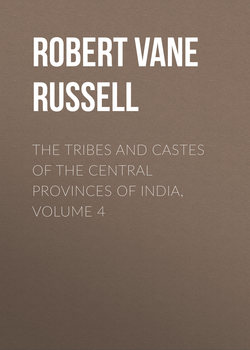Читать книгу The Tribes and Castes of the Central Provinces of India, Volume 4 - Robert Vane Russell - Страница 63
Part II
Articles on Castes and Tribes
Kumhār—Yemkala
Vol. IV
Kurmi
24. Return of the soul
ОглавлениеOn the third day the pindas or sacrificial cakes are offered and this goes on till the tenth day. These cakes are not eaten by the priest or Mahā-Brāhman, but are thrown into a river. On the evening of the third day the son goes, accompanied by a Brāhman and a barber, and carrying a key to avert evil, to a pīpal67 tree, on whose branches he hangs two earthen pots: one containing water, which trickles out through a hole in the bottom, and the other a lamp. On each succeeding night the son replenishes the contents of these pots, which are intended to refresh the spirit of the deceased and to light it on its way to the lower world. In some localities on the evening of the third day the ashes of the cooking-place are sifted, and laid out on a tray at night on the spot where the deceased died, or near the cooking-place. In the morning the layer of ashes is inspected, and if what appears to be a hand- or footprint is seen, it is held that the spirit of the deceased has visited the house. Some people look for handprints, some for footprints, and some for both, and the Nais look for the print of a cow’s hoof, which when seen is held to prove that the deceased in consideration of his singular merits has been reborn a cow. If a woman has died in child-birth, or after the birth of a child and before the performance of the sixth-day ceremony of purification, her hands are tied with a cotton thread when she is buried, in order that her spirit may be unable to rise and trouble the living. It is believed that the souls of such women become evil spirits or Churels. Thorns are also placed over her grave for the same purpose.
67
Ficus R.
